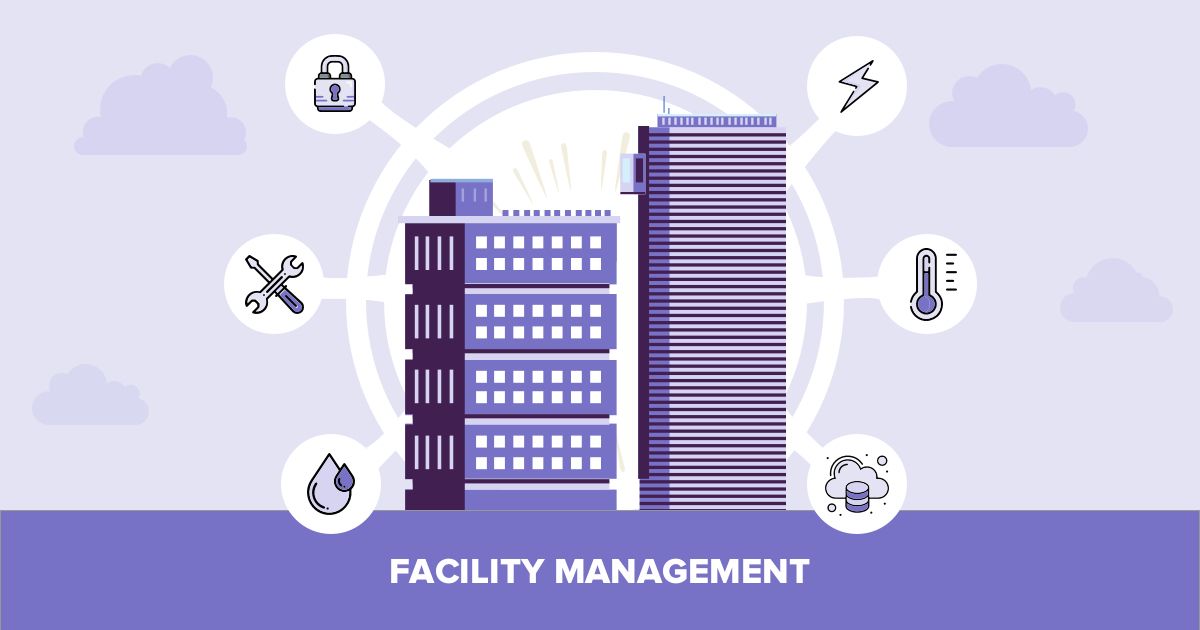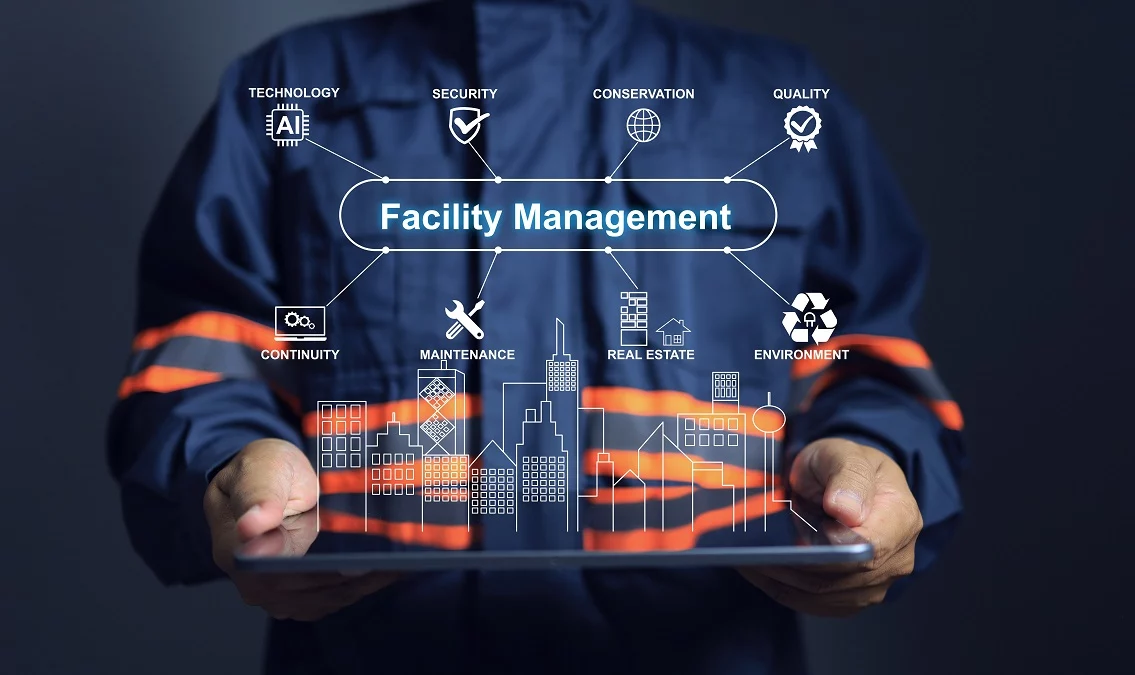The Duty of Facility Management in Sustainable Operations
The Duty of Facility Management in Sustainable Operations
Blog Article
Trick Trends Forming the Future of Facility Management in 2024
As we look in advance to 2024, the landscape of facility monitoring is poised for considerable transformation, driven by several key fads. The integration of wise structure technologies and a change towards data-driven decision-making promise to enhance operational performance while prioritizing sustainability in method.
Smart Structure Technologies

Smart structure modern technologies incorporate a vast selection of systems, including intelligent lights, heating and cooling controls, and security systems. By integrating these systems, facility supervisors can keep track of and change parameters in real-time, causing significant decreases in power waste and functional costs. For instance, clever sensing units can spot occupancy levels and readjust lights and temperature accordingly, making certain that power is just made use of when needed.
Moreover, these modern technologies help with enhanced data collection, allowing companies to track use patterns and recognize chances for additional enhancements. The application of smart structure modern technologies not only adds to sustainability objectives yet likewise creates much healthier workplace that can boost worker efficiency and complete satisfaction.
As we move right into 2024, the fostering of smart structure technologies will likely accelerate, mirroring a broader shift towards more intelligent, responsive, and sustainable center management methods.
Data-Driven Decision Making
Significantly, organizations are leveraging data-driven choice making to enhance center management methods. By utilizing information analytics, facility managers can acquire actionable understandings that significantly enhance operational efficiency and source allocation. The assimilation of sophisticated modern technologies, such as IoT sensing units and real-time tracking systems, allows the collection of substantial quantities of data on building efficiency, tenancy prices, and energy consumption.
This wealth of information enables facility supervisors to determine patterns, forecast upkeep demands, and proactively address problems before they intensify. Anticipating analytics can forecast tools failings, decreasing downtime and repair expenses. Additionally, information visualization tools assist in better communication among stakeholders, making certain that educated choices are made collaboratively.
Additionally, data-driven strategies enhance strategic preparation by making it possible for center managers to assess the effectiveness of current practices and make informed options relating to investments in technology or facilities. As companies significantly focus on operational excellence, data-driven decision making is positioned to become a cornerstone of successful center management approaches in 2024 and past. Eventually, the capability to utilize information properly will encourage organizations to create a lot more effective, productive, and resistant facilities.
Sustainability and Green Practices
The focus on data-driven decision making naturally straightens with the expanding focus on sustainability and environment-friendly techniques within center management. As companies increasingly prioritize environmental responsibility, center managers are leveraging analytics to enhance source use, decrease waste, and lessen carbon impacts. This critical strategy enables the assimilation of energy-efficient systems, such as LED lights, smart HVAC controls, and eco-friendly power resources into center procedures.
Additionally, the application of lasting techniques prolongs beyond energy consumption. Facility supervisors are promoting and taking on environment-friendly materials recycling efforts to develop a circular economy within their facilities. This not just boosts the ecological profile of the company yet additionally cultivates a culture of sustainability amongst workers.
Compliance with environmental guidelines is an additional important element driving the adoption of eco-friendly techniques. By utilizing data analytics, facility supervisors can monitor conformity metrics and determine locations for renovation, ensuring adherence to regional and worldwide sustainability criteria.
Hybrid Job Designs
A significant change towards crossbreed work models is reshaping the landscape of center monitoring in 2024. This paradigm incorporates remote and in-office job, necessitating a reevaluation of room usage, source appropriation, and worker this contact form involvement techniques. Organizations are increasingly recognizing the value of versatile workspaces that accommodate diverse demands and preferences.
Facility managers need to adjust by executing functional office layouts that sustain collective initiatives while supplying locations for concentrated work. This consists of the integration of modern technology to promote seamless interaction and cooperation amongst remote and in-office staff members. Smart building remedies, geared up with sensing units and analytics, permit real-time tracking of space use, enabling companies to optimize their settings effectively.
Moreover, crossbreed job versions emphasize the need for efficient center management that focuses on staff member experience. This includes not just technology and room design but also the development of plans that advertise a balanced work-life dynamic. As companies browse this change, the function of facility management ends up being crucial in developing a nimble workplace that promotes performance and drives business success. Basically, the hybrid work version is reinventing facility administration, motivating an aggressive technique to satisfy the advancing needs of the labor force.
Enhanced Passenger Health
As organizations accept hybrid work versions, an increased emphasis on passenger wellness is coming to be important to facility administration strategies. Facility Management. This shift acknowledges that a satisfied and healthy and balanced workforce directly affects performance and retention rates. Facility supervisors are now prioritizing atmospheres that advertise physical and psychological wellness, integrating aspects such as natural lights, biophilic design, and available wellness resources

Innovation plays a crucial role in this development. Smart building systems can keep an eye on ecological aspects and adjust setups in real-time, making certain optimal comfort levels - Facility Management. In addition, comments mechanisms, such as occupancy sensing units and worker surveys, permit facility managers to constantly improve wellness campaigns based on resident needs.

Conclusion
In 2024, the future of center management will be dramatically affected by the assimilation of smart structure read the full info here modern technologies and data-driven decision-making, promoting improved operational efficiency. These trends jointly underscore the progressing landscape of center administration in reaction to modern obstacles and possibilities.
Center supervisors are taking on environment-friendly materials and promoting reusing campaigns to produce a round economic situation within their centers.A significant shift this content towards hybrid work designs is improving the landscape of facility monitoring in 2024.Additionally, crossbreed job designs highlight the requirement for reliable facility management that focuses on worker experience.As organizations accept hybrid work versions, a heightened emphasis on occupant wellness is ending up being indispensable to center monitoring strategies.In 2024, the future of center management will be significantly affected by the integration of clever structure technologies and data-driven decision-making, promoting enhanced operational effectiveness.
Report this page